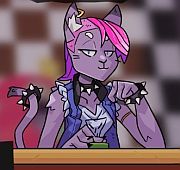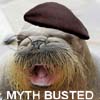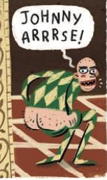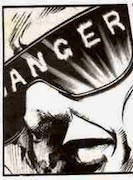|
Just finished it off. I had entirely forgotten the handbag subplot. Quite a lot of fun. Although I played Jack in a high school performance, so many years have passed ( Lady Bracknell got all the best lines really
|
|
|
|
|

|
| # ? May 29, 2024 04:16 |
|
Bilirubin posted:Just finished it off. I had entirely forgotten the handbag subplot. i likewise was in the play in hs and had forgotten essentially everything. i assume my brain just mercifully blocked it out
|
|
|
Tree Goat posted:i likewise was in the play in hs and had forgotten essentially everything. i assume my brain just mercifully blocked it out yeah I can only cringe so hard, glad there is no video out there
|
|
|
|
|
Earnest is one of my favorite plays of all time so I was happy to take the excuse to revisit it. It really is just that drat funny.
|
|
|
|
Actually went back and finished Steppenwolf, I was only like 5 pages from Hermine and you guys were right it went much faster after that. I have no idea what was going on in the ending, I assume just some kind of drug fueled hallucinating? It would have been nice to have a few paragraphs about what happened afterwards without the LSD filter, but it is what it is.
|
|
|
|
"To lose one parent may be regarded as misfortune; to lose both is just carelessness" is the kind of line I'm always finding uses for.
|
|
|
|
Rand Brittain posted:"To lose one parent may be regarded as misfortune; to lose both is just carelessness" is the kind of line I'm always finding uses for. The one about the widow whose hair turned "quite gold from grief" has stuck with me forever.
|
|
|
|
Just picked this up today.
|
|
|
|
Ok now that we're at Day 15 I'm going to unveil the second phase of my plan here This month is actually a compare and contrast. quote:The play was first produced at the St James's Theatre on Valentine's Day 1895.[26] It was freezing cold, but Wilde arrived dressed in "florid sobriety", wearing a green carnation.[24] The audience, according to one report, "included many members of the great and good, former cabinet ministers and privy councillors, as well as actors, writers, academics, and enthusiasts".[27] Allan Aynesworth, who played Algernon Moncrieff, recalled to Hesketh Pearson that "In my fifty-three years of acting, I never remember a greater triumph than [that] first night".[28] Aynesworth was himself "debonair and stylish", and Alexander, who played Jack Worthing, "demure".[29] quote:The Ballad of Reading Gaol is a poem by Oscar Wilde, written in exile in Berneval-le-Grand, after his release from Reading Gaol (/rɛ.dɪŋ.dʒeɪl/) on 19 May 1897. Wilde had been incarcerated in Reading after being convicted of gross indecency with other men in 1895 and sentenced to two years' hard labour in prison. quote:
quote:In 2017, Wilde was among an estimated 50,000 men who were pardoned for homosexual acts that were no longer considered offences under the Policing and Crime Act 2017 (homosexuality was decriminalised in England and Wales in 1967). The 2017 Act implements what is known informally as the Alan Turing law.[234] You can download a free copy of The Ballad of Reading Gaol here: https://www.gutenberg.org/ebooks/301 quote:I know not whether Laws be right,
|
|
|
|
|
Downloaded to my Google Books. Will give that a read. Actually I've been to Wilde's grave at Pere Lachaise Cemetery back in early 2000s or so. The story I was told by my friend (who lives across the wall from the place) is that some lady back in the past sometime was scandalized by the rather large cock and balls dangling from the otherwise Art Nouveau sculpture of a dude with angel wings kneeling that they chucked a rock at it and knocked it off. Apparently, its in the groundskeeper's office for safekeeping. Visited Balzac, Hugo, and Proust on that same trip, among others (especially old scientists).
|
|
|
|
|
McSpankWich posted:Actually went back and finished Steppenwolf, I was only like 5 pages from Hermine and you guys were right it went much faster after that. I have no idea what was going on in the ending, I assume just some kind of drug fueled hallucinating? It would have been nice to have a few paragraphs about what happened afterwards without the LSD filter, but it is what it is. I can agree with this take. I also take the psychedelic ending as a suggestion that an optimistic future is possible for Harry without the author having to find a way to end the book by bringing Harry's personal growth to an end. That way the ending of the book is about the journey rather than the destination, I guess, but it's because of the ending (and the tedious introspections at first) that I don't think I'd recommend this book to just anyone. I can say that this book has some deep personal meaning to me and has helped with the strugg, so I will declare it a success. I read Importance of Being Earnest years ago and it was one of my absolute favourite plays. I'm going to sit that out though because I've already read it and because I've found a great read of my own for this month. If anyone is interested it is The Lure of the Labrador Wild by Dillon Wallace, available on Project Gutenberg. It's a true memorialisation of an expedition into the interior of Labrador, which was largely uncharted in 1903ish, that proved fatal for one of the party of 3. Good stuff.
|
|
|
|
I am working my way through the poem collection but it takes a lot longer to process than prose.
|
|
|
|
I haven't done a poll, but this month's Book of the Month is by decree. The Somethingawful Book of the Month for May 2023 is The King Must Die by Mary Renault.  The "elevator pitch" for this book is fairly straightforward: it's an attempt to write the Myth of Theseus as historical fiction, as "accurately" and "truly" as possible given modern knowledge from archaeology and scholarship, "modern" in this case being the 1950's. quote:I came home from seeing a performance of Euripides’s Hippolytos on Friday night and immediately curled up with Mary Renault’s The King Must Die (1958), one of my favourite books of all time. It’s the first person story of Theseus, and Renault used the legend and everything that has been discovered by archaeology since, especially the excavation of Knossos, to write a story that’s psychologically as well as historically realistic. It’s also so engraved in my DNA that I am incapable of evaluating it sensibly. I know it almost by heart and could quote long passages. It seems to me to be exactly the way everyone ought to write historical fiction—in first person, written in reflection by the character late in life, and deep within the worldview of the period. I first read it when I was seven years old1, and even though I didn’t understand all the words it made me fall in love with the ancient world and Greek mythology and Achaean kingship. https://www.tor.com/2012/06/27/the-very-breath-of-bronze-age-greece-mary-renaults-the-king-must-die/ quote:Eileen Mary Challans (4 September 1905 – 13 December 1983), known by her pen name Mary Renault (/ˈrɛnoʊlt/[2]),[1] was an English writer best known for her historical novels set in ancient Greece. quote:Mary Renault, née Mary Challans, (4 September 1905 – 13 December 1983) was an English author of primarily historical novels. The King Must Die is in copyright, but is available a few places: https://www.amazon.com/King-Must-Die-Novel/dp/0394751043 https://www.barnesandnoble.com/w/king-must-die-mary-renault/1103272970 https://openlibrary.org/works/OL3906339W/The_King_Must_Die We've done Renault previously as BOTM once before; her novel The Last of the Wine was a BOTM in 2015: https://forums.somethingawful.com/showthread.php?threadid=3647305 Hieronymous Alloy fucked around with this message at 23:22 on May 2, 2023 |
|
|
|
|
Hell yeah.
|
|
|
|
very excited for this
|
|
|
|
Some context: Renault's "Artistic project" here is an attempt to write a novel that functions as an update of the Theseus mythology for then-current scholarship and archaeology etc. But, keep in mind, that means what was current in the first half of the twentieth century. So, her archaeology is this:  quote:The bull-leaping fresco is the most completely restored of several stucco panels originally sited on the upper-story portion of the east wall of the palace at Knossos in Crete. It shows a bull-leaping scene. Although they were frescos, they were painted on stucco relief scenes. They were difficult to produce. The artist had to manage not only the altitude of the panel but also the simultaneous molding and painting of fresh stucco. The panels, therefore, do not represent the formative stages of the technique. In Minoan chronology, their polychrome hues – white, pale red, dark red, blue, black – exclude them from the Early Minoan (EM) and early Middle Minoan (MM) Periods. They are, in other words, instances of the "mature art" created no earlier than MM III. The flakes of the destroyed panels fell to the ground from the upper story during the destruction of the palace, probably by earthquake, in Late Minoan (LM) II. By that time the east stairwell, near which they fell, was disused, being partly ruinous. quote:Now that the restriction of the Ottoman firman was removed, there was a great rush on the part of all the other archaeologists to obtain first permission to dig from the new Cretan government. They soon found that Evans had a monopoly. Using the Cretan Exploration Fund, now being swollen by contributions from others, he paid off the debt for the land. Then he ordered stores from Britain. He hired two foremen, and they hired 32 diggers. He started work on the flower-covered hill in March 1900. And her mythology is often this kinda thing: quote:James Frazer has a lot to answer for. https://www.tor.com/2019/12/27/inventing-folklore-the-origins-of-the-green-man/ and this: quote:The White Goddess: a Historical Grammar of Poetic Myth is a book-length essay on the nature of poetic myth-making by the English writer Robert Graves. First published in 1948, the book is based on earlier articles published in Wales magazine; corrected, revised and enlarged editions appeared in 1948, 1952 and 1961. The White Goddess represents an approach to the study of mythology from a decidedly creative and idiosyncratic perspective. Graves proposes the existence of a European deity, the "White Goddess of Birth, Love and Death", much similar to the Mother Goddess, inspired and represented by the phases of the Moon, who lies behind the faces of the diverse goddesses of various European and pagan mythologies.[1] https://en.wikipedia.org/wiki/The_W...%20mythologies. Hieronymous Alloy fucked around with this message at 23:56 on May 2, 2023 |
|
|
|
Anyway, this book is a genuine favorite of mine. To anyone who might be on the fence, here's a taste of the opening:quote:
|
|
|
|
|
Hieronymous Alloy posted:I haven't done a poll, but this month's Book of the Month is by decree. Like some sort of Tyrant, eh?  Hieronymous Alloy posted:The Somethingawful Book of the Month for May 2023 is The King Must Die by Mary Renault. Ooooo, this looks good!
|
|
|
|
Relevant to my interests! Love that classical poo poo. Got to visit Knossos as a teen, it is extremely cool and I still think about it a lot. You could really see how the myth of the labyrinth might come from a place like that.
|
|
|
|
I cheated by reading this one ahead of schedule. The benefit to having done so is that I went in completely blind, so I got to play the game of guessing whether she was going to go with the myths being real, or mundane explanations for the myths. With the way it's written, it took me a surprising amount of the book to be sure.
|
|
|
|
Theseus, blue eyed and blonde haired, typical greek. The layered tits-out dresses his mother wears sound accurate for mycenian greece but T-dog wears pants? Was a hero in a short skirt too much for 1958 readers, or did Renault have an issue, I wonder.
|
|
|
AngusPodgorny posted:o play the game of guessing whether she was going to go with the myths being real, or mundane explanations for the myths. With the way it's written, it took me a surprising amount of the book to be sure. I mean, there's at least a decent argument either way. That's one of the things I like most about it; she writes convincingly from the viewpoint of someone for whom mythology was real.
|
|
|
|
|
I'm really enjoying this, it's scratching an itch for me.
|
|
|
|
I read this and The Last of the Wine in my freshman year of college and really loved both of them. Great pick.
|
|
|
|
Glimpse posted:Theseus, blue eyed and blonde haired, typical greek. The layered tits-out dresses his mother wears sound accurate for mycenian greece but T-dog wears pants? Was a hero in a short skirt too much for 1958 readers, or did Renault have an issue, I wonder. I can't see where this art/cover image you're describing is, but for what it's worth there are plenty of characters in classic Greek sources described as fair haired, can't remember about eye colour. Remember that modern Greeks are a little bit Turkish although you should absolutely not mention this to them. As for Greeks in trousers, you're right it would be unthinkable. But I very much doubt Mary Renault had any issues with men in skirts, almost all her novels explicitly have gay male romance as a major plot point, this novel and its sequel are actually the only ones I can think of that don't have a gay male protagonist.
|
|
|
|
Genghis Cohen posted:I can't see where this art/cover image you're describing is, but for what it's worth there are plenty of characters in classic Greek sources described as fair haired, can't remember about eye colour. Remember that modern Greeks are a little bit Turkish although you should absolutely not mention this to them. As for Greeks in trousers, you're right it would be unthinkable. But I very much doubt Mary Renault had any issues with men in skirts, almost all her novels explicitly have gay male romance as a major plot point, this novel and its sequel are actually the only ones I can think of that don't have a gay male protagonist. Chapter 3: “I began to be tired, and cold; my leather breeches dragged at my thighs, my wet belt pinched my breathing. “ “He is blue eyed and flaxen like a Hellene; but he is built like the Shore People, wiry and quick and small” I know that Achilles for example is blonde, but the “like a Hellene” part made me chuckle, because, well, met many Greeks? I doubt that ancient Greeks were significantly lighter haired than modern ones because ancient sources tend to associate light hair with barbarians. Heroes having light hair could have been meant to show their exeptionality or imply grace (children often have light hair that darkens with age). The pants thing stood out because the novel seems so well researched otherwise. Renault absolutely knew that they were anachronistic but chose to put them in anyhow. What’s up with that? Totally enjoying the read, just poking a bit of fun.
|
|
|
Glimpse posted:Chapter 3: Yeah, you're correct, this is an interesting catch because she is normally great about not making that kind of mistake, and at first glance it does seem like an error. I think we may have to assume she meant something like this and ascribe the use of the word "Breeches" to the "Translator" : quote:
https://www.encyclopedia.com/humanities/culture-magazines/fashion-minoan-period
|
|
|
|
|
I’m gonna do the June book, I’m just mid-another book now but should be finished by the end of this month. When do they usually get announced?
|
|
|
Actually about thatquote:
I'll be stepping down as TBB mod at the end of this month (for good positive reasons -- I've had some positive real life developments and it doesn't look like I'm going to have time to keep doing this). So I don't want to just declare and pick a book for next month; if the book club keeps going the format may change considerably. Normally, I gather suggestions around . . . now, and then ideally we do a vote from the 26th to month end, and then whatever wins the vote by the 1st of the next month is the book going forward, or if we don't get around to doing a poll I just pick something. If people want to suggest books for next month we can do a poll to pick something provisionally.
|
|
|
|
|
I am deep into one of my selections for The Year Of The Brick but will be done by month's end. I have a handful of palate cleansing horror chapbooks but were it up to me, I would suggest a brick (purely out of self interest): Don Quixote (was ages ago since last done as a BotM), Sarum (historical fiction, likely done in the past BotMs? I can't believe I'm going to have to get archives for this thread...) or The Plantagenets (history non fiction about the royal family).
|
|
|
|
|
I finished the king must die and I thought it was pretty good.
|
|
|
|
I finished The King Must Die a week or so ago and I really, really enjoyed it. I would, and already have, recommend it to others. There were two things off the top of my head that stuck-out. The first is Renault's prose is beautiful. The second is that Renault's story-telling technique is such a wonderful accessible way of placing a myth in an educational/historical context. I wish scholarship (particularly historical scholarship) would use this technique more often because it's a great way of relating learning to a much wider audience instead of the typically small, stuffy academic audience. In that way, this book reminds me of Natalie Zemon's The Return of Martin Guerre, whichI would heartily recommend to anyone who enjoyed The King Must Die, and even for a BOTM if it hasn't already been done. I wish I'd posted about this book sooner after finishing it so I could discuss some of the things I found surprising and cite examples, but it's been a crazy couple weeks. I'll just say I loved this book and thank you for the recommend.
|
|
|
Captain Splashback posted:The second is that Renault's story-telling technique is such a wonderful accessible way of placing a myth in an educational/historical context. I wish scholarship (particularly historical scholarship) would use this technique more often because it's a great way of relating learning to a much wider audience instead of the typically small, stuffy academic audience. Another author who does something very similar, but with Celtic mythology, is Evangeline Walton in her four-volume treatment of the Mabinogion. quote:Walton is best known for her four novels retelling the Welsh Mabinogi. She published her first volume in 1936 under the publisher's title of The Virgin and the Swine. Although receiving warm praise from John Cowper Powys, the book sold poorly and none of the other novels in the series reached print at the time. Rediscovered by Ballantine's Adult Fantasy series in 1970, it was reissued as The Island of the Mighty. quote:In 1983, Walton published The Sword is Forged, the first of a planned Theseus trilogy.[2] Walton had completed the trilogy in the late 1940s but the publication by Mary Renault of her Theseus novels in 1958 and 1962 kept Walton from publishing her own. The remaining two novels in the trilogy remain unpublished.[6] They really are quite excellent but she just sortof got eclipsed.
|
|
|
|
|
Hieronymous Alloy posted:Another author who does something very similar, but with Celtic mythology, is Evangeline Walton in her four-volume treatment of the Mabinogion. Quoting because I think you just recommended me my next readings. Thank you! I really dig this style
|
|
|
Bilirubin posted:I am deep into one of my selections for The Year Of The Brick but will be done by month's end. I have a handful of palate cleansing horror chapbooks but were it up to me, I would suggest a brick (purely out of self interest): Don Quixote (was ages ago since last done as a BotM), Sarum (historical fiction, likely done in the past BotMs? I can't believe I'm going to have to get archives for this thread...) or The Plantagenets (history non fiction about the royal family). Unless a new mod revises it, let's do Don Quixote for next month, since it's free and a good place for a new beginning.
|
|
|
|
|
have you named a successor?
|
|
|
Hieronymous Alloy posted:Unless a new mod revises it, let's do Don Quixote for next month, since it's free and a good place for a new beginning. Hell yeah! Once current brick is done on to new brick!
|
|
|
|
|
Riddle me this! Why is his name pronounced don quiHotay but his actions are quicksotic???
|
|
|
|
Finished The King Must Die. It was solidly ok. An interesting read as I've never read the Theseus myth directly and just in other things. Not sure I'd recommend it to anyone, but I can't put my finger on why. Perhaps it was weirdly paced or the writing was... Something? I don't know. Also, I'm going to skip Don Quixote because I tried to read it a few years ago and found it boring but also it's like 12 trillion pages long.
|
|
|
|

|
| # ? May 29, 2024 04:16 |
|
https://twitter.com/frogsforgirls/status/1664935296171929600?s=20
|
|
|
|





























